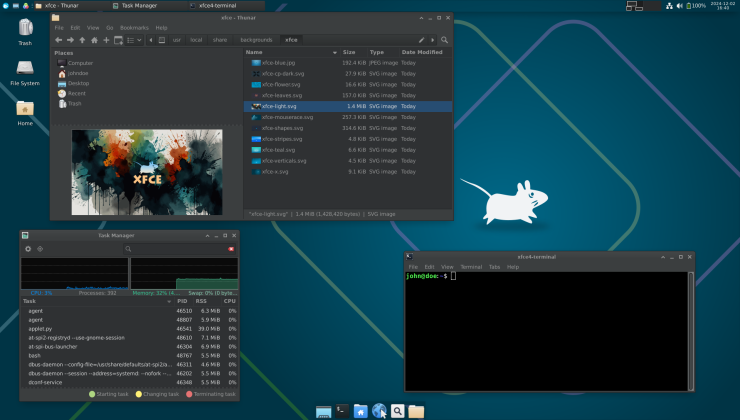I was asked by a Patreon supporter to note down some thoughts on what to look for when you’re thinking about pledging to a crowdfunding campaign.
Note: These are my personal thoughts on the matter, so yours may differ. It’s okay not to agree with me on this.
First of all, to make it clear: I am not against crowdfunding at all. I think it’s a brilliant idea that has allowed some truly fantastic games to be made. The problem is that a few bad apples (hello Stainless Games) have spoiled things for a lot of Linux gamers.
The first thing to check: Have they backed anything else on that crowdfunding platform? If not it means they are a brand new user with not a single check done by the platform to check that they are who they say they are. It’s not foolproof, of course, but it’s the only starting point.
The next thing you need to think about: Do they mention Linux and/or SteamOS on the campaign page at all? If the answer is no, then the answer should be obvious. You can contact the creator through the crowdfunding platform directly or their social media channels to make sure. If they don’t answer then take the hint. Obviously give them a little bit of time to respond (2 days at least), since they may be getting lots of questions.
Now, you should look at how far along the project is. The most risky projects are those that only provide mockups (some form of art, not actual screenshots); I would personally steer clear of them, no matter who the developer is. If they cannot provide a video of something, then nothing actually exists, so the risk here is massive. You could argue they don’t want to show a video of something terribly early on, but you also can’t assume they even have anything. The first step towards losing your money is making assumptions like that. Keep in mind that projects have completely failed even when they have had plenty to show you, so if they have nothing — don’t be foolish.
If they have provided something other than mockups, you should next look to see what their actual experience is. I’m not talking about Linux directly here, but have they shipped anything before? If no then, again, the risk is quite high here. If they have shipped something, you then need to see if they have any experience with building something for Linux. It does not matter if they are using a cross-platform engine, as pushing a button to export is never as simple as it sounds. There’s plenty that can go wrong and plenty of platform-specific issues in all game engines. A demo, no matter how basic it may be, is a good indication that they’ve at least tried to make things work on their target platforms.
Leading into the above about their experience, do they mention on their campaign page where the funds will be going? You will be surprised at how many developers don’t realize the costs involved. Things like taxes which can be very complicated!
Is the project big, and if so, do you honestly think the date they say they will deliver it actually reasonable? Think on how long some massive games take to make, if their delivery date seems too soon, then it probably is.
If all of that checks out, then sit on it for a good week or so. See how communicative the developer is to the community. There is no harm in waiting to see if the developer will actually keep up communication.
If you have any more thoughts on the matter, be sure to share them in the comments.
Note: These are my personal thoughts on the matter, so yours may differ. It’s okay not to agree with me on this.
First of all, to make it clear: I am not against crowdfunding at all. I think it’s a brilliant idea that has allowed some truly fantastic games to be made. The problem is that a few bad apples (hello Stainless Games) have spoiled things for a lot of Linux gamers.
The first thing to check: Have they backed anything else on that crowdfunding platform? If not it means they are a brand new user with not a single check done by the platform to check that they are who they say they are. It’s not foolproof, of course, but it’s the only starting point.
The next thing you need to think about: Do they mention Linux and/or SteamOS on the campaign page at all? If the answer is no, then the answer should be obvious. You can contact the creator through the crowdfunding platform directly or their social media channels to make sure. If they don’t answer then take the hint. Obviously give them a little bit of time to respond (2 days at least), since they may be getting lots of questions.
Now, you should look at how far along the project is. The most risky projects are those that only provide mockups (some form of art, not actual screenshots); I would personally steer clear of them, no matter who the developer is. If they cannot provide a video of something, then nothing actually exists, so the risk here is massive. You could argue they don’t want to show a video of something terribly early on, but you also can’t assume they even have anything. The first step towards losing your money is making assumptions like that. Keep in mind that projects have completely failed even when they have had plenty to show you, so if they have nothing — don’t be foolish.
If they have provided something other than mockups, you should next look to see what their actual experience is. I’m not talking about Linux directly here, but have they shipped anything before? If no then, again, the risk is quite high here. If they have shipped something, you then need to see if they have any experience with building something for Linux. It does not matter if they are using a cross-platform engine, as pushing a button to export is never as simple as it sounds. There’s plenty that can go wrong and plenty of platform-specific issues in all game engines. A demo, no matter how basic it may be, is a good indication that they’ve at least tried to make things work on their target platforms.
Leading into the above about their experience, do they mention on their campaign page where the funds will be going? You will be surprised at how many developers don’t realize the costs involved. Things like taxes which can be very complicated!
Is the project big, and if so, do you honestly think the date they say they will deliver it actually reasonable? Think on how long some massive games take to make, if their delivery date seems too soon, then it probably is.
If all of that checks out, then sit on it for a good week or so. See how communicative the developer is to the community. There is no harm in waiting to see if the developer will actually keep up communication.
If you have any more thoughts on the matter, be sure to share them in the comments.
Some you may have missed, popular articles from the last month:
All posts need to follow our rules. For users logged in: please hit the Report Flag icon on any post that breaks the rules or contains illegal / harmful content. Guest readers can email us for any issues.
Nice article. Your approach to crowded funded games mirrors my own. I'm not against crowdfunding either (or early access), it's just that we see so many bad cases that I become vary of it.
I do want to clarify some things that people should keep in mind if Linux is a stretch goal, if so you should take the stance that it won't come to Linux. The only times I consider supporting it for Linux is when Linux is one of the supported platforms.
Another thing you should keep in mind is what engine they are using. Cryengine games have a history of not coming to Linux. Am I right when I say that most games that are ported to Linux are either in house engines, Unity or UE4?
I do want to clarify some things that people should keep in mind if Linux is a stretch goal, if so you should take the stance that it won't come to Linux. The only times I consider supporting it for Linux is when Linux is one of the supported platforms.
Another thing you should keep in mind is what engine they are using. Cryengine games have a history of not coming to Linux. Am I right when I say that most games that are ported to Linux are either in house engines, Unity or UE4?
3 Likes, Who?
I'm with rcgamer. Until there are legal protections in place for the consumer, crowdfunding is essentially e-panhandling, imo.
0 Likes
Never have and never will do crowdfunding. Don't do pre-ordering either. Crowdfunding to me just makes no sense from the consumer's standpoint.
Crowd funding is no place for consumers. Consumers will have to wait until after the product comes to market.
1 Likes, Who?
Never have and never will do crowdfunding. Don't do pre-ordering either. Crowdfunding to me just makes no sense from the consumer's standpoint.
Crowd funding is no place for consumers. Consumers will have to wait until after the product comes to market.
Sorry, but that's complete rubbish. Crowd-funding was invented -specifically- as an alternative to venture capital or similar means of funding. Its very point is to allow regular customers to band together and fund projects that otherwise might not get funded by traditional means. People don't seem to get the idea that crowdfunding is nothing but small-scale venture capital funding. It involves risk. There is no guarantee that you will get anything back. And if you can't afford and/or stand the thought to lose your pledge then you need to stay away from it, indeed.
But for many of us, it has worked nicely and will continue to do so. As Liam's article pointed out, the art of crowdfunding from the customer's perspective is proper vetting. Telling projects with good chances of success apart from the doomed ones. That's really the gist of it.
16 Likes, Who?
All I'm saying is that if anyone pays into a crowd funded project and expects a 100% guaranteed chance of return, that person is kind of an idiot.
1 Likes, Who?
Sorry, but that's complete rubbish. Crowd-funding was invented -specifically- as an alternative to venture capital or similar means of funding. Its very point is to allow regular customers to band together and fund projects that otherwise might not get funded by traditional means. People don't seem to get the idea that crowdfunding is nothing but small-scale venture capital funding. It involves risk. There is no guarantee that you will get anything back. And if you can't afford and/or stand the thought to lose your pledge then you need to stay away from it, indeed.
This. I wish more people realised it.
1 Likes, Who?
Crowdfunding to me just makes no sense from the consumer's standpoint.I agree. Crowd-funding places all the risk on the consumer with no guarantee that they will get a return on their "investment" and little if any practical recourse if they don't.
3 Likes, Who?
I would also add a point when a game has Linux port as a stretch goal. They are basically making people risk pledging to reach the stretch goal. That means if you pledge too soon and the project won't reach the stretch goal you just pledged on a non-linux game. For example System Shock Remake did that, even though they eventually shown Linux demo, making ports as stretch goals does feel shady, because it's afterthought and bonus and those get cut first if problems happen.
6 Likes, Who?
Crowd funding is no place for consumers. Consumers will have to wait until after the product comes to market.
Sorry, but that's complete rubbish. Crowd-funding was invented -specifically- as an alternative to venture capital or similar means of funding.
I dunno, it kind of sounds to me like your example proves his point, a venture capitalist, even if he is a regular joe on kickstarter is someone who is proactively investing in something, whereas a consumer is just waiting passively.
Maybe just a misunderstanding of terminology?
1 Likes, Who?
Were there any video game kickstarters that needed funding for a freeware release? Just curious, because it'd be more about art and not business.
0 Likes
So, TL;DR check if develover delivered a linux port of his previous work.
1 Likes, Who?
Is there a legal basis for crowdfunding? I looked around a bit but couldn't find anything.
Say, how does it actually compare to classic VC? What are the rights and obligations of both the investor and the investee? I remember this, I think it was with Peter Molyneux, interview. It was said that just to reach the funding goal -- because it is all or nothing -- they started promising effectively BS. Where does "risk" end and intentional misinformation start?
Is it legally on the same level as a lottery? You throw some money in and maybe you get something? Because that's what it looks like to me. Just gambling.
I've been staying away from crowdfunding and will probably continue to do so.
Say, how does it actually compare to classic VC? What are the rights and obligations of both the investor and the investee? I remember this, I think it was with Peter Molyneux, interview. It was said that just to reach the funding goal -- because it is all or nothing -- they started promising effectively BS. Where does "risk" end and intentional misinformation start?
Is it legally on the same level as a lottery? You throw some money in and maybe you get something? Because that's what it looks like to me. Just gambling.
I've been staying away from crowdfunding and will probably continue to do so.
0 Likes
I would also add a point when a game has Linux port as a stretch goal. They are basically making people risk pledging to reach the stretch goal. That means if you pledge too soon and the project won't reach the stretch goal you just pledged on a non-linux game. For example System Shock Remake did that, even though they eventually shown Linux demo, making ports as stretch goals does feel shady, because it's afterthought and bonus and those get cut first if problems happen.
Stay clear of stretch goals, definitely. They would be great if and only if you could pledge based on the stretch. So I pledge my £25, but we don't meet the stretch, but that's okay, my money isn't used.
This would also make platform-specific stretch goals much more sensible from the "other" side's point of view, that everyone pledging to a project after the initial goal is reached is now pledging to the stretch goal, whether they want it to or not - how many "Linux as a stretch goal" targets were met by Windows gamers, none of which cared about Linux, pledging to the project simply because they wanted in?
2 Likes, Who?
I think if people look at crowdfunding as a version of pre-ordering then supporting a crowdfunded game does not makes sense. However if you look at it as 'Do I want to see this project that would otherwise not go forward happen bad enough to put some money into it and maybe it will succeed' then supporting crowdfunding campaigns make sense. I have personally supported probably 25 projects and due to doing some serious evaluation of each project I only had 4 of them go bad so far. I also never put in more than 15-20 dollars so that if the project fails I can write off the loss without regrets. But just before the crowdfunding tend to offer you a copy of the game as a reward don't start categorising this as 'buying' in your head, because if you do then of course it doesn't make sense.
3 Likes, Who?
So, TL;DR check if develover delivered a linux port of his previous work.No, there's a lot more, read it. It' not even very long.
1 Likes, Who?
Stay clear of stretch goals, definitely. They would be great if and only if you could pledge based on the stretch. So I pledge my £25, but we don't meet the stretch, but that's okay, my money isn't used.
Stretch goals are a bit of a pet peeve of mine. How often do you find a list of stretch goals where they arranged 5 stretch goals, the first 4 of which you couldn't care less about, but you REALLY want the 5th to happen? To the degree you actually don't want the game at all if it's not getting funded? Like the 5th goal being the Linux port, after such super important things like localization for countries you never heard of before.
So yes, the only logical course of action is to wait and see if the 5th goal is likely to be reached and then (only then!) pledge. If it's not reached after all, cancel your pledge on the last day. No, that's not a nice thing to do, but neither is supporting a platform only as a stretch goal. *shrug*
3 Likes, Who?
Thank you for your article. I personally do crowdfund - mostly games and hardware. For games, I mostly do it because I do get the soundtrack that is otherwise unavailable. I also did a "Linux guaranteed" corwdfunding that did not deliver in now five years.
On all others I did not get disappointed. Dont expect to get a bargain, though.
On all others I did not get disappointed. Dont expect to get a bargain, though.
0 Likes
I agree with those who said above, that crowdfunding from the backers' perspective involves estimating the risk. But to add to that, crowdfunding also is often used by developers for estimating the demand. From that perspective, I'm willing to take some more risk as a Linux user than usual, just to demonstrate said demand. But surely, it's much easier to back developers with proven record of high quality Linux games, than total newcomers without any history.
Last edited by Shmerl on 29 Jan 2017 at 2:13 am UTC
Last edited by Shmerl on 29 Jan 2017 at 2:13 am UTC
3 Likes, Who?
Back in the day, I Kickstarted several games, all of which promised Linux versions, most of which panned out quite well: Wasteland 2, Pillars of Eternity, Planetary Annhiliation, and War for the Overworld. Akaniero: Demon Hunters was a waste of my money and it's free now, with a 35% positive rating. I have also prepurchased Torment:Tides of Numenara (can't wait).
Last edited by oldrocker99 on 29 Jan 2017 at 5:18 am UTC
Last edited by oldrocker99 on 29 Jan 2017 at 5:18 am UTC
1 Likes, Who?
... I'm willing to take some more risk as a Linux user than usual, just to demonstrate said demand.
But there lies a problem, you *cannot* demonstrate Linux demand. Not until there is some "Linux or money back" checkbox when you pledge.
0 Likes














See more from me